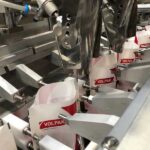Coordinated by the British Nutrition Foundation, the Diet and Health Open Innovation Research Club (OIRC) aims to foster collaboration among experts in behavior, nutrition, and food science to conduct new research on health and diet. The goal is to disseminate this information to countries worldwide through engagement with the global research community, with the intention of impacting public health globally, not just in the United Kingdom.
The Diet and Health OIRC receives funding from the Department for Environment Food and Rural Affairs (Defra), the Biotechnology and Biological Sciences Research Council (BBSRC), Innovate UK, and the Medical Research Council (MRC). This funding enables the OIRC to facilitate collaborations between academics, industry professionals, and policymakers, helping them identify areas where innovation is needed.
Bridget Benelam, Nutrition Scientist for the British Nutrition Foundation, highlights that the OIRC’s focus is on achieving real-life benefits for the public, such as reformulated products, new functional foods, or innovative approaches to packaging and labeling. As the projects unfold, the results will be published in the public domain, and progress updates will be shared by both the British Nutrition Foundation and the innovation hubs themselves.
The involvement of industry leaders in this collaborative project is crucial, with key players already participating and the list of participants continuously expanding. The OIRC invites individuals from various sectors of the food chain, including large multinationals and small-and-medium-sized enterprises (SMEs), to join the relevant hubs, make their voices heard, and seize the opportunity to contribute to cutting-edge research.
Globally, there is a pressing health crisis related to diet and nutrition. Poor diets have been connected to various diseases, including cardiovascular diseases, which are the leading cause of death worldwide. Hypertension affects 31% of the population, and 69% of women of reproductive age suffer from at least one macronutrient deficiency. Additionally, 39% of people worldwide either suffer from underweight or obesity. Undernutrition is responsible for almost half of all child deaths under the age of five, hindering socio-economic growth, occupational opportunities, and educational achievements.
With the global population projected to reach 9.7 billion by 2064, these challenges will become even more urgent. Therefore, the Diet and Health OIRC acts as a platform for collaboration among industry professionals, academics, and policymakers to address this global crisis, aiming to improve dietary issues worldwide, not just in the UK.
The innovation hubs within the Diet and Health OIRC will tackle nutritional problems by focusing on several key areas. One of these areas is understanding how food influences physiological responses that may lead to obesity. By investing in innovation, the OIRC helps industries develop products that encourage healthier choices and reduce obesity. Academic research supports product innovation, offering valuable scientific insights that complement industry efforts to combat this issue. The Ripen Hub, in collaboration with Imperial College London, the University of Surrey, PepsiCo, and UK Research and Innovation, will explore this further.
Another hub, the Biofortification Hub, explores ways to enhance the micronutrient content of crops. This process, known as biofortification, involves methods such as breeding, enriched fertilizers, and genetic modification to increase the nutritional value of crops. Collaboration between experts in soil health, crop genetics, human health, food innovation, and industry professionals along the biofortification supply chain is crucial to strengthen the UK’s biofortification research and identify areas for important research.
The Consumer Hub recognizes the significance of the food environment and its impact on consumer health. Changes in food packaging, processing, labeling, and other factors influence consumers’ perceptions and purchasing decisions. By using interdisciplinary teams from both industry and academia, the Consumer Hub examines consumer food choices, gathering data through innovative methods such as covert digital image capture and wearable monitoring devices. The research focuses on diverse sample groups beyond university students, including marginalized and hard-to-reach communities that face food insecurity.
The INFORM Hub explores the relationship between gut microbiota and functional foods that target it. Probiotics, prebiotics, and plant stanols play a role in positively affecting gut microbiota. The Hub investigates functional foods’ potential in areas such as mood, stress, health, disease, and sports science, aiming to optimize recovery, sports performance, and mental well-being through these foods.
The i-Nutrilife hub explores nutrition’s impact on growth and development, encompassing childhood development to aging. By studying how food changes biological and physiological processes, the hub incorporates elements of consumer behavior, functional foods, and biofortification into its research.
Lastly, the STAR hub focuses on enhancing plant-based foods and developing products tailored to different stages of consumers’ lives. With a specific focus on polyphenols, fiber, and resistant starch, the hub offers targeted plant-based products and systems. The i-Nutrilife and STAR hubs share a common objective of understanding how food and beverages can deliver improved nutrition throughout the entire life course.
Sara Stanner, Science Director at the British Nutrition Foundation, emphasizes the importance of translating nutrition research into practical solutions that promote healthier and more sustainable products. This collaboration allows for significant impact on the food chain, from agriculture to the products available on supermarket shelves, ultimately benefiting people’s health and well-being.
Dr. Ruth Nottingham, Head of Business Engagement and Intelligence from the BBSRC, notes that the OIRC represents a substantial investment aimed at addressing critical barriers to innovation in the food and drink sector. By bringing together leaders from academia, industry, and other stakeholders, the OIRC ensures effective coordination among the innovation hubs, facilitating knowledge sharing across the entire food system.




